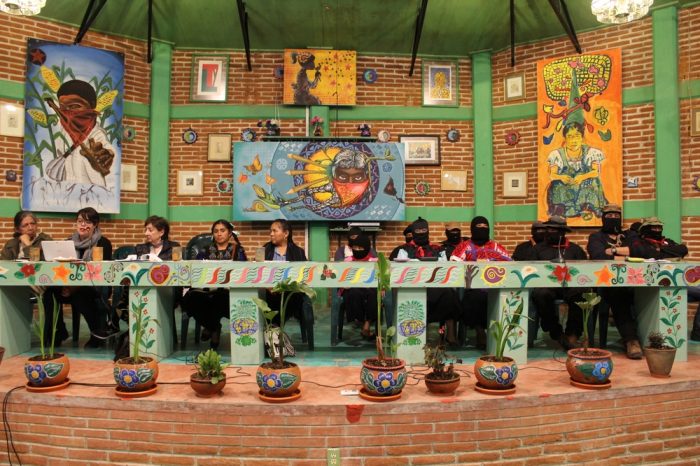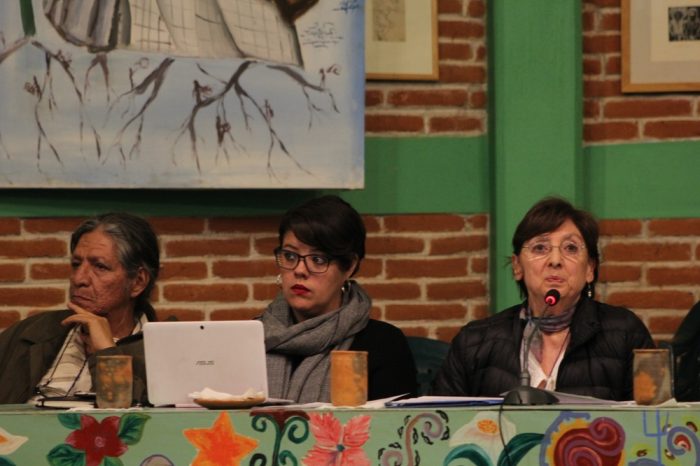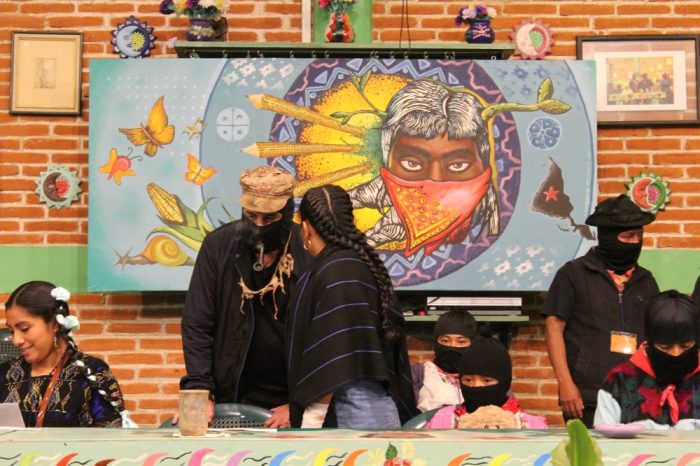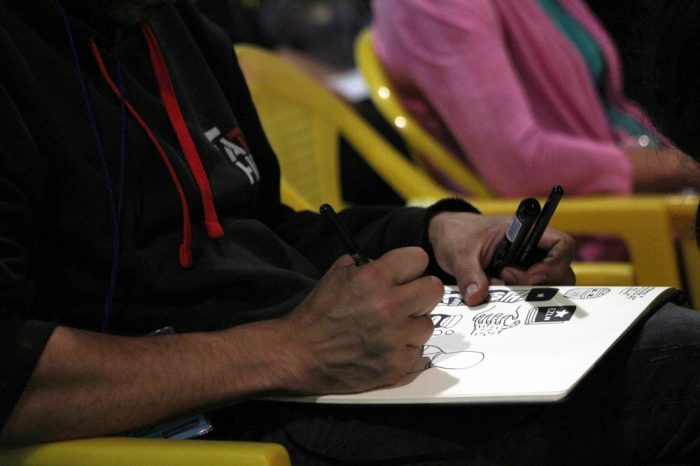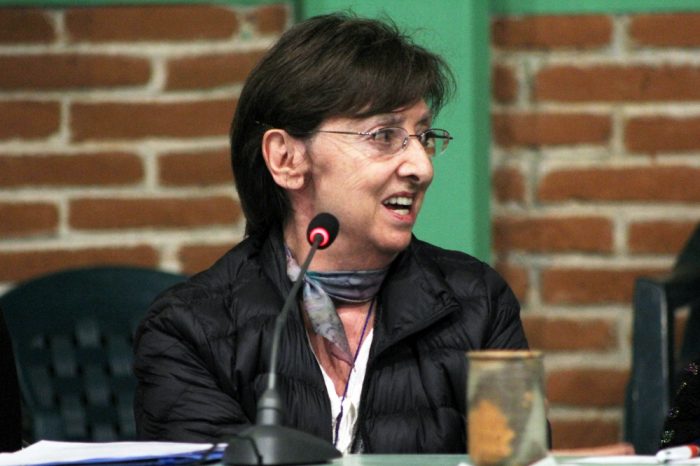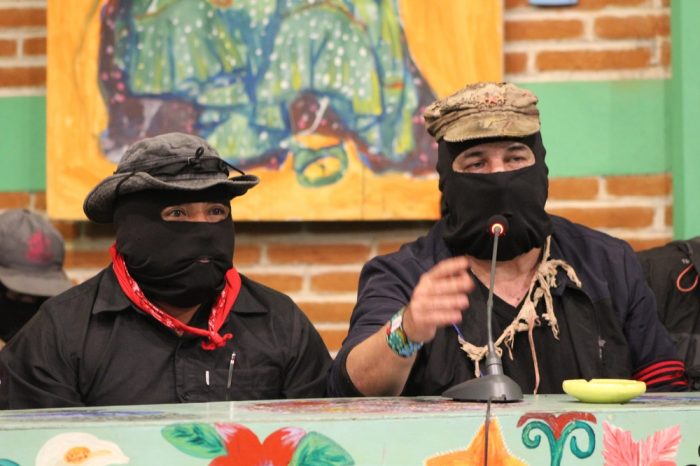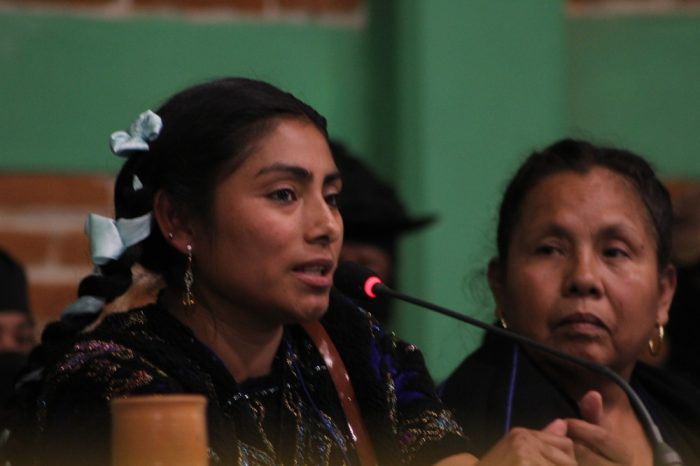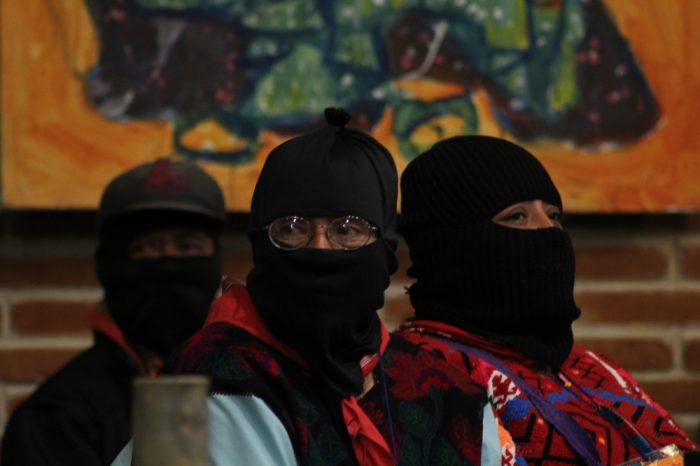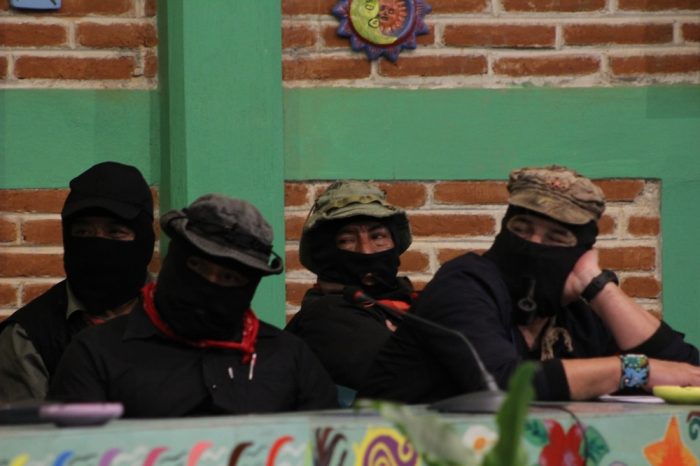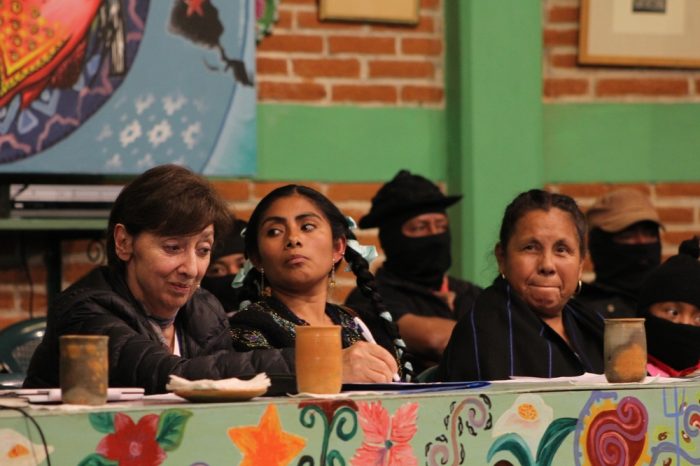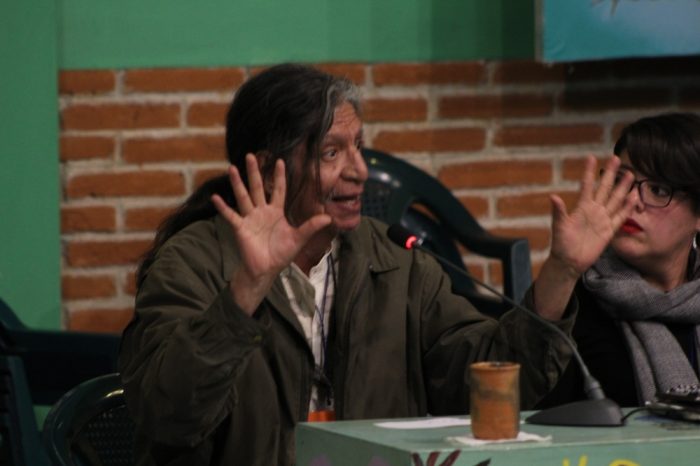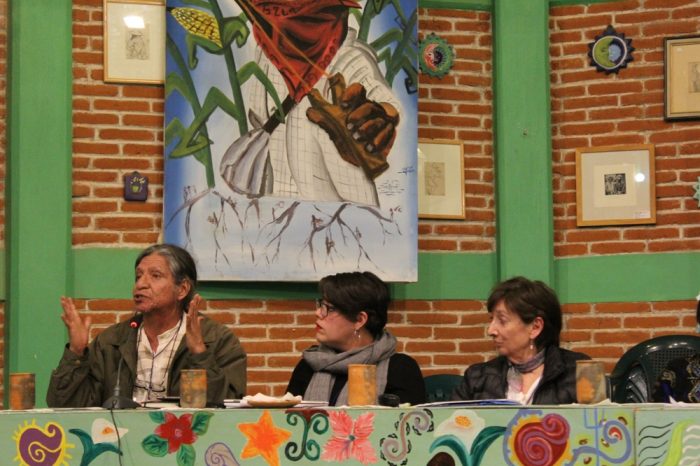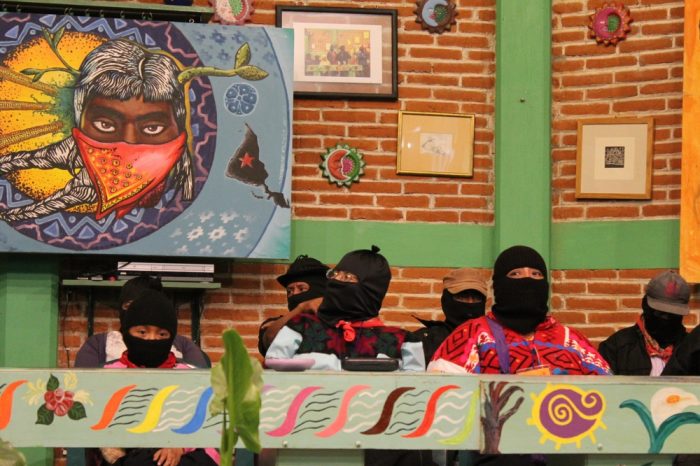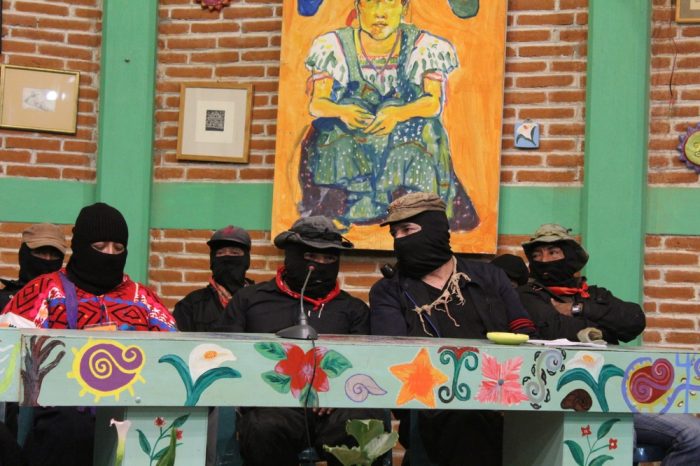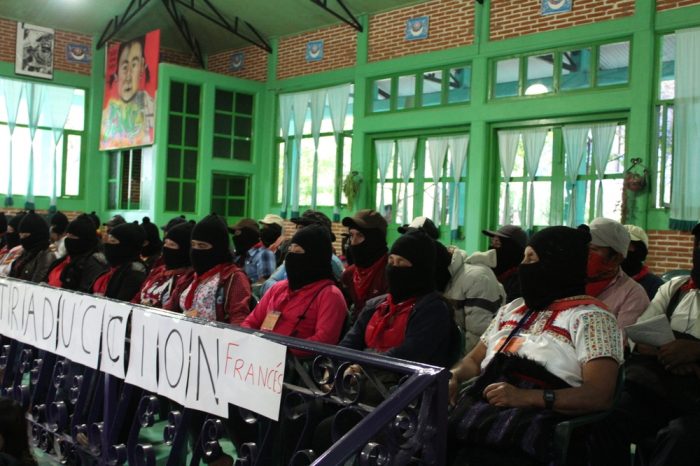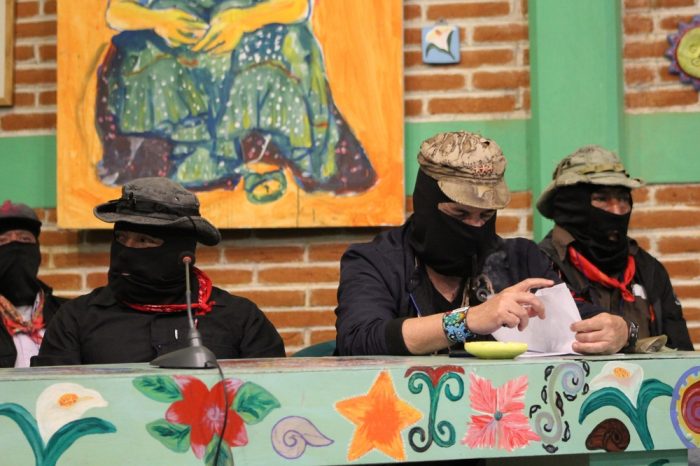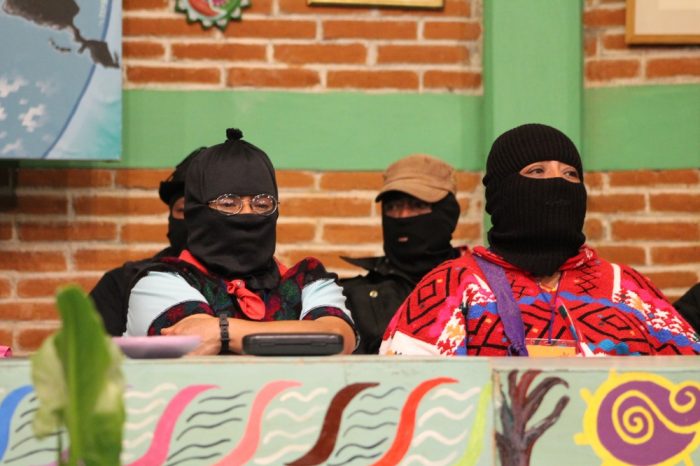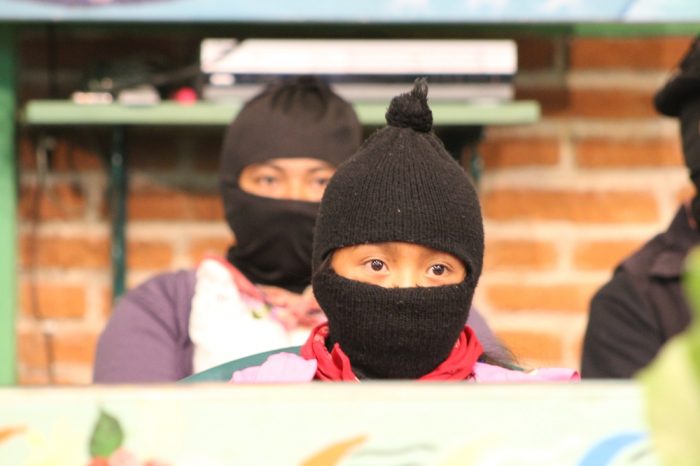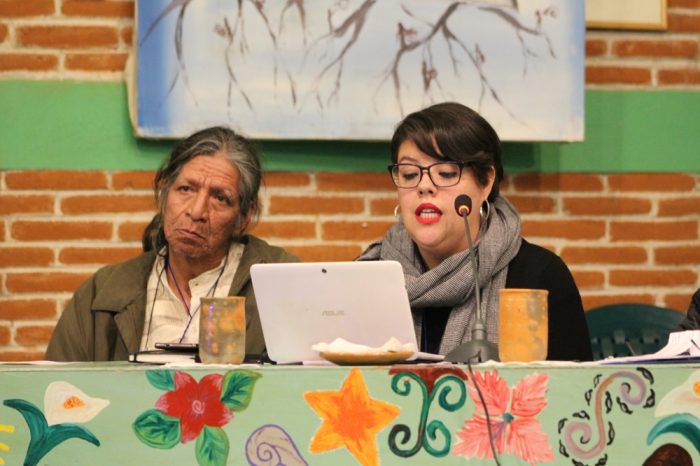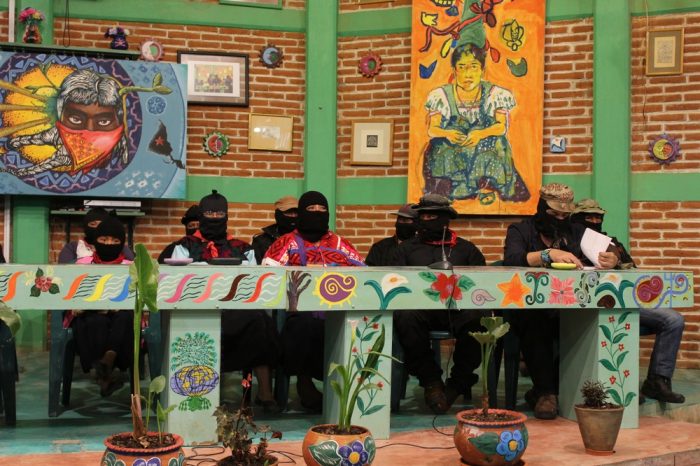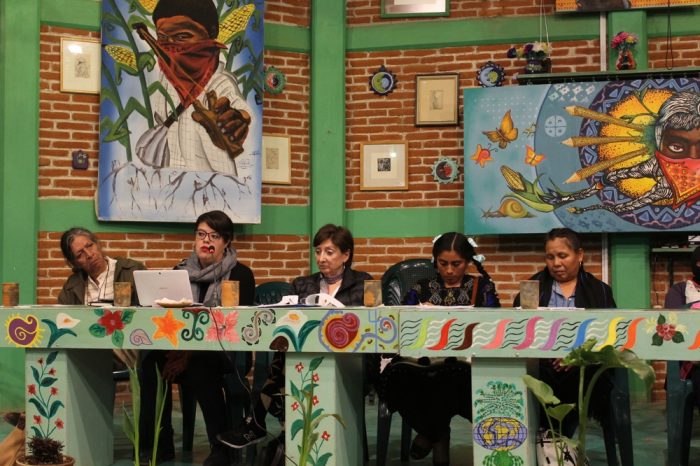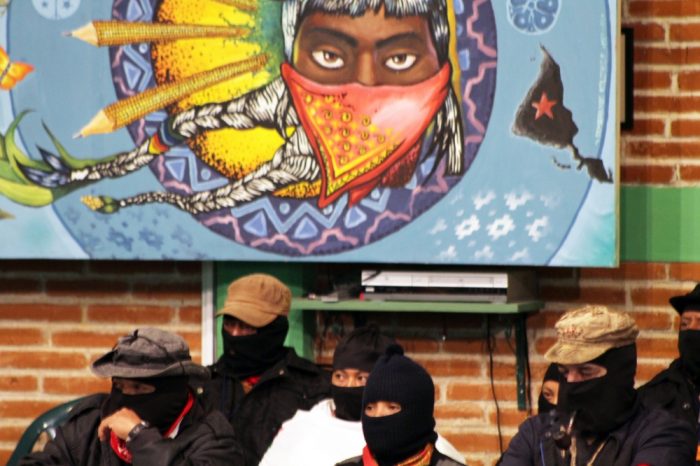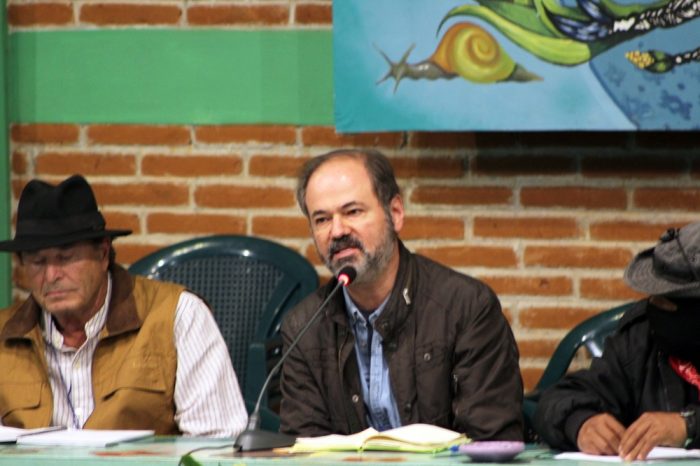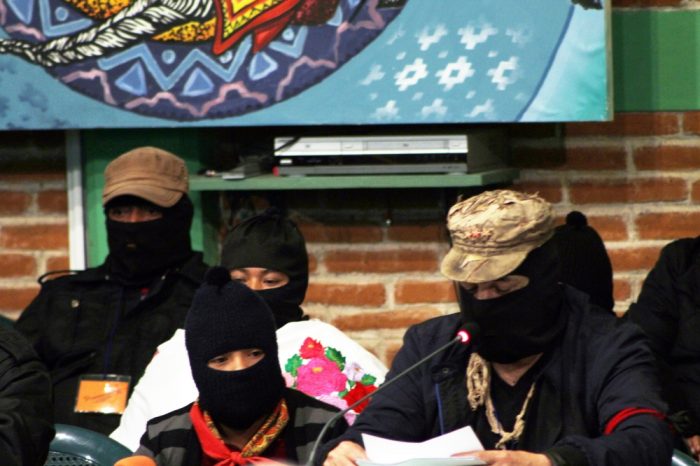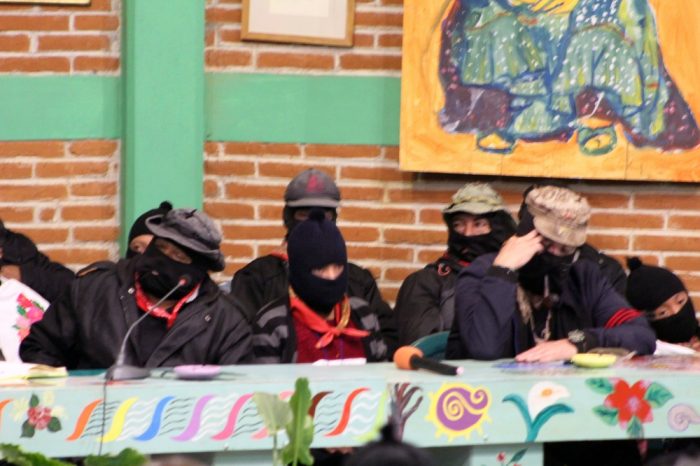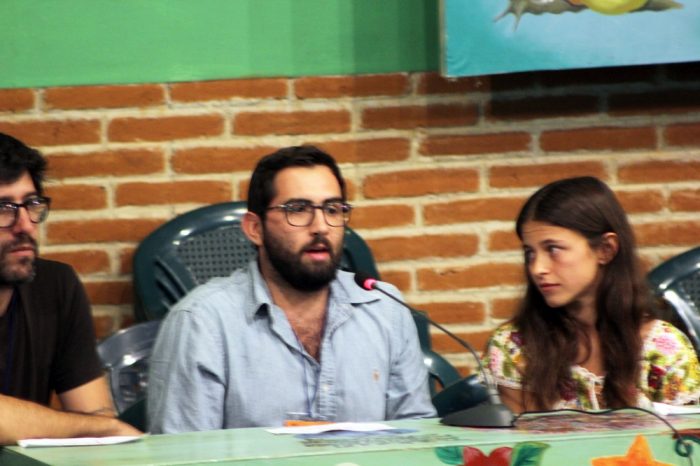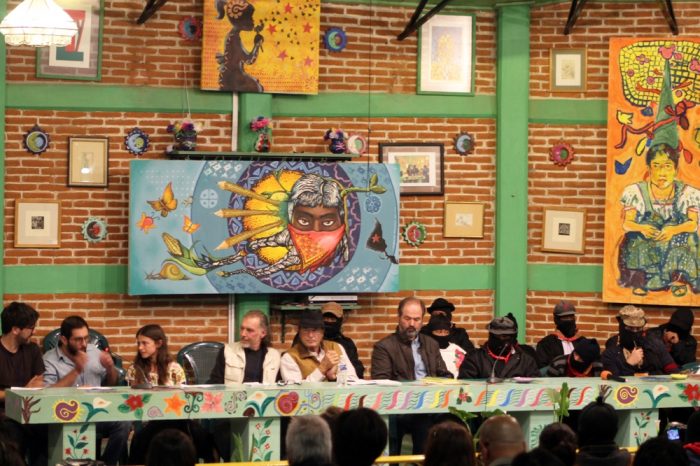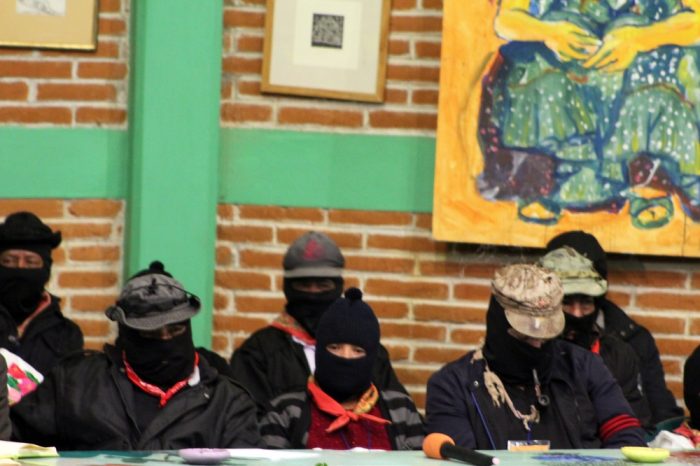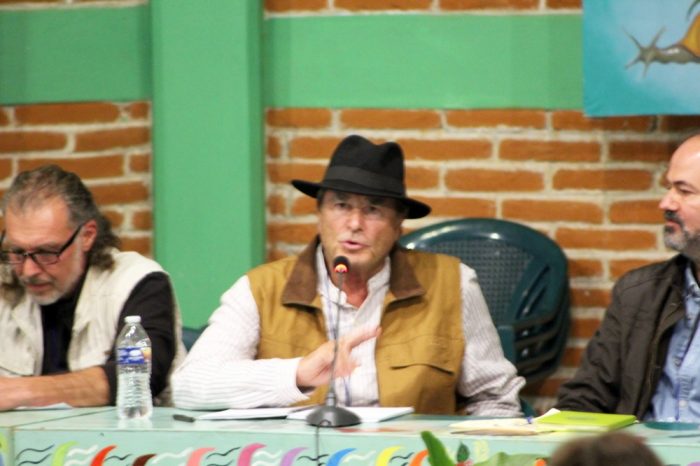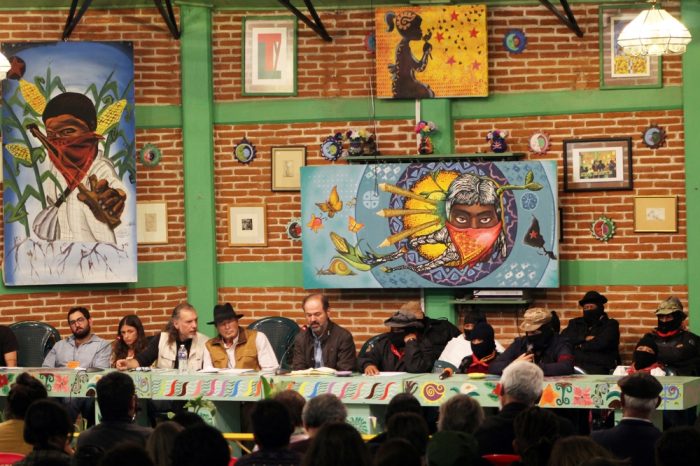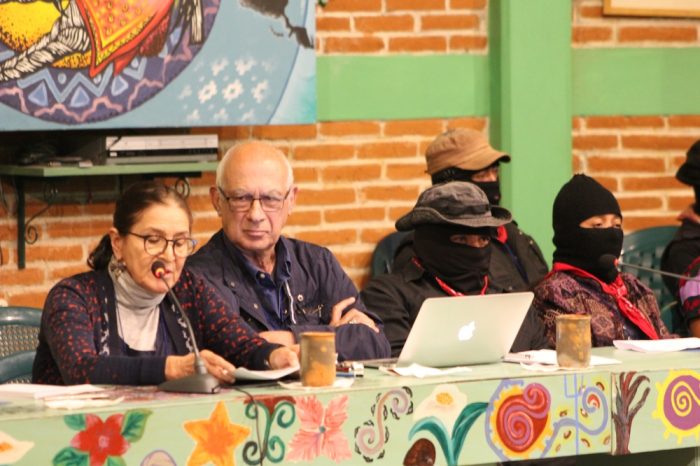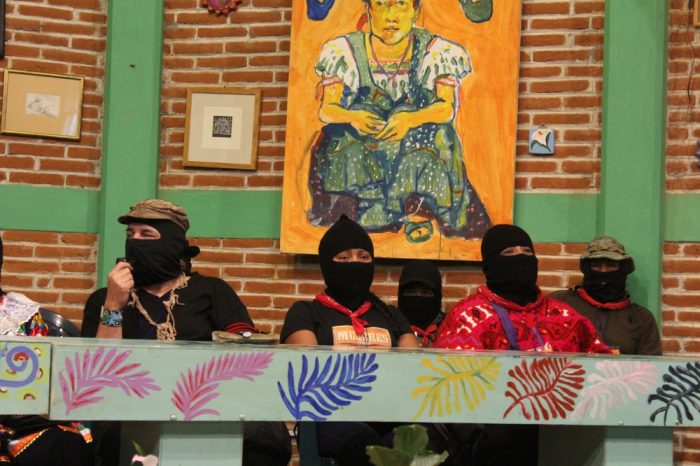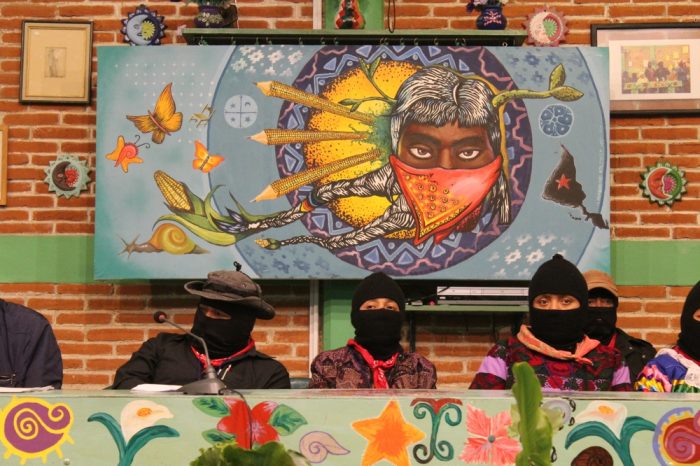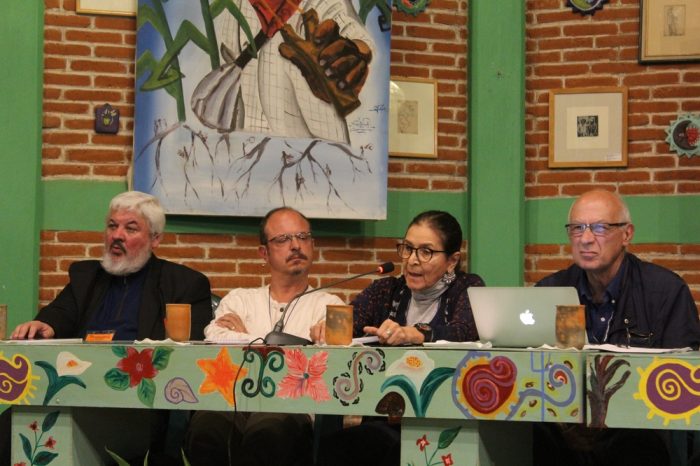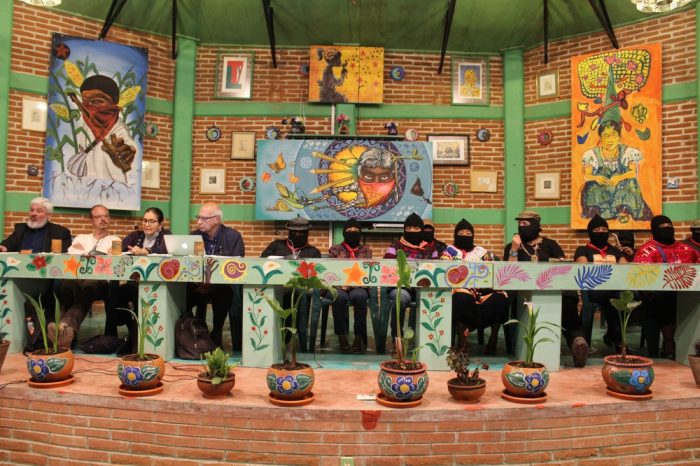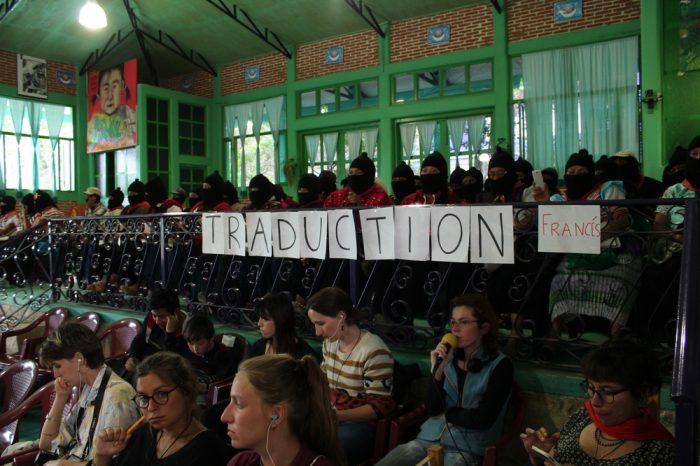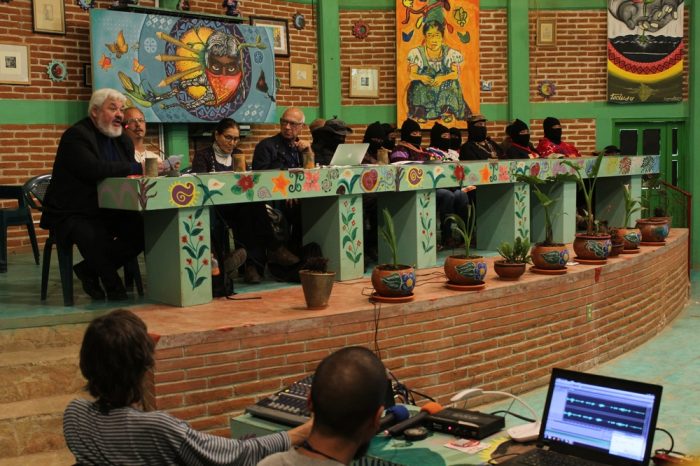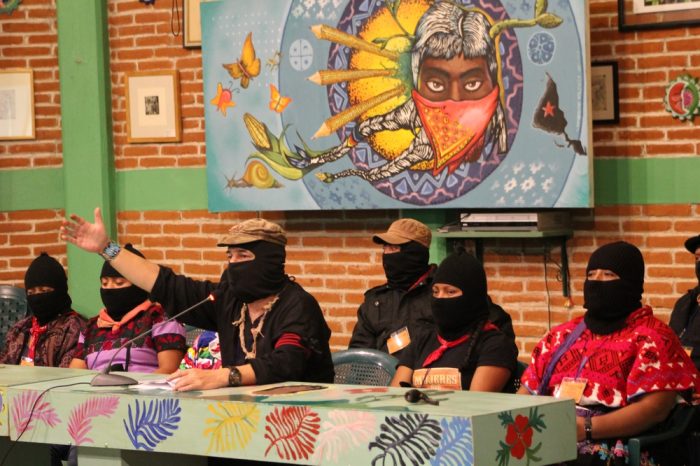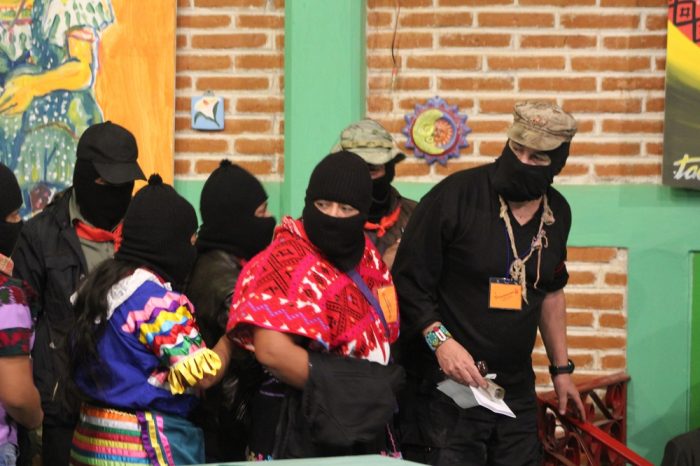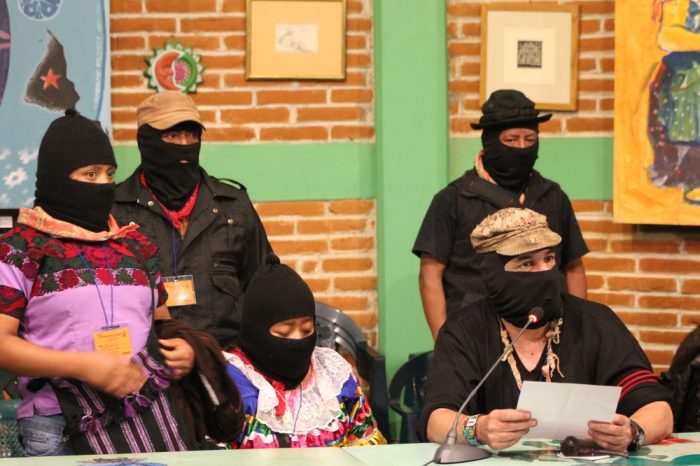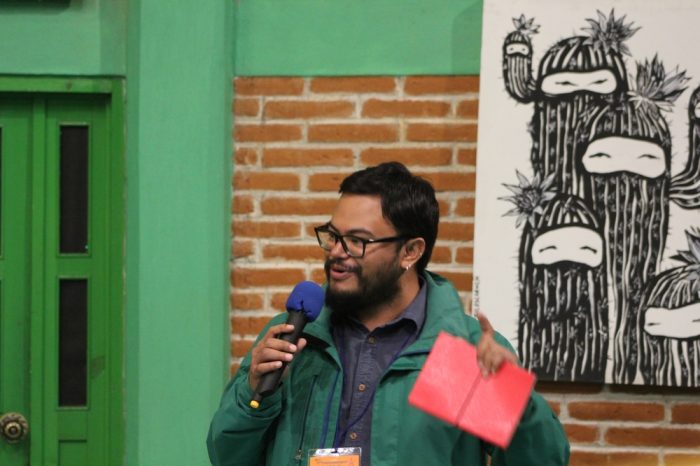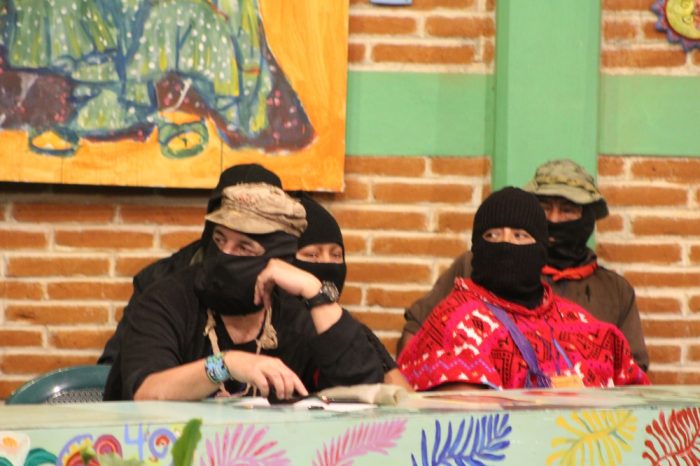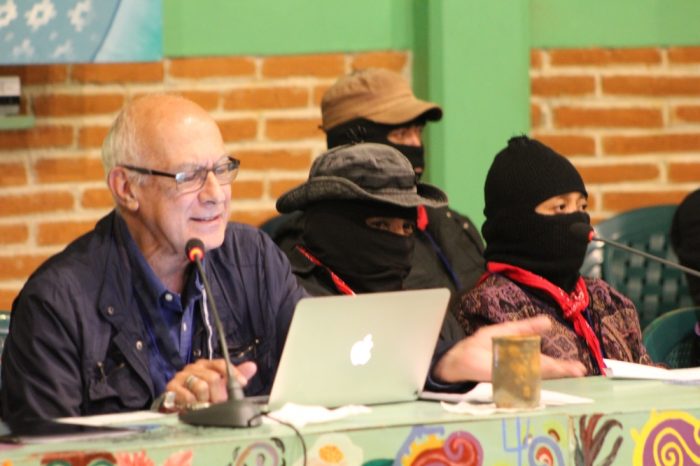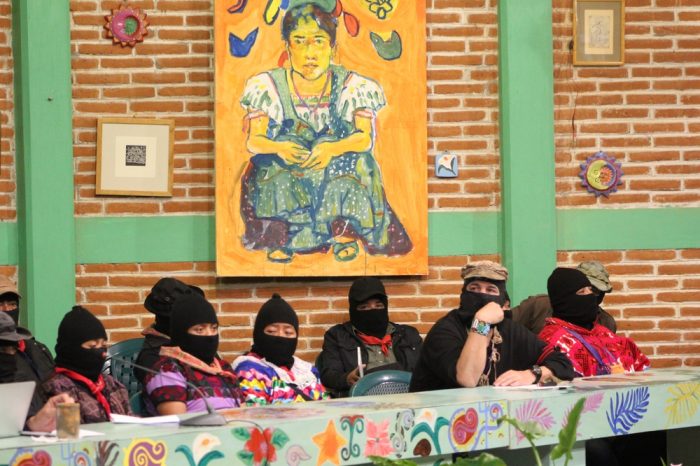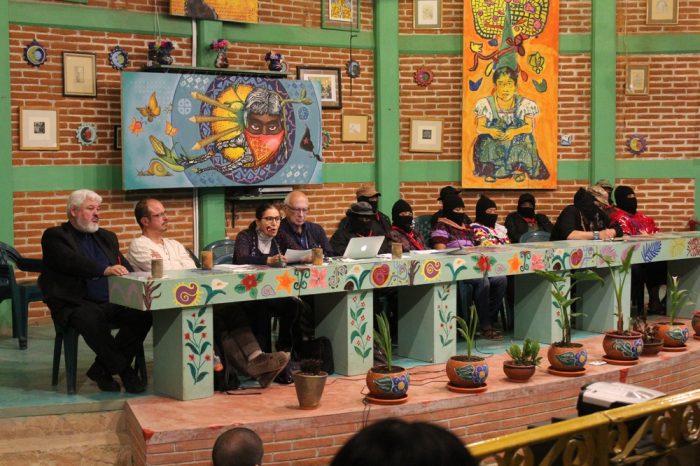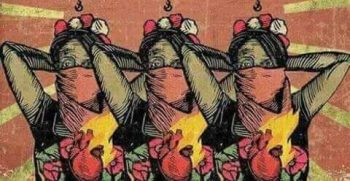
(Español) ¿Y entonces, quiénes? – Día 5, Conversatorio “Miradas, escuchas, palabras: ¿prohibido pensar?”
En su segundo turno a la palabra, la joven concejal tsotsil Lupita Vázquez inició el recuento de su experiencia de los últimos meses con una aparente contradicción que suena a ejemplo de las avenidas hacia la libertad evocadas por Paul Theroux al conocer hace unos días el caracol de Oventik: “He aprendido mucho y al mismo tiempo no he aprendido nada”. Jaime Martínez Luna señaló que nunca entendió la propuesta pero le había dado gusto darle su firma a Marichuy y, poco antes que ambos, Fernanda Navarro compartió su incredulidad para explicarse por qué no se había logrado entender en todos los rincones de este país tan herido una propuesta tan inédita e incluso más fuerte que el “Ya basta” de 1994, aunque adelantó que quizás ahora, sin el maldito reloj del INE, es cuando realmente ella arrancará. Y la Comisión Sexta del EZLN, en voz del SubGaleano aportó dos guías decisivas a la valoración colectiva de esta tarde: en los comunicados del CIG y el CNI sobre la propuesta nunca se alojaron meses sino décadas y, a diferencia de 1994, esta vez la convocatoria a hacer frente a la guerra no es excluyente sino incluyente.
Esta tarde, las dudas sobre la posibilidad de ganar el partido quizás se volvieron miradas, pensamientos y preguntas sobre el campo de juego y sobre quiénes han desdeñado o temido no ya firmar sino entrarle al partido. Por ejemplo, Lupita contó que a los concejales solían pedirles carreteras o preguntarles si las comunidades podían formar parte del CNI aunque recibieran apoyo económico del gobierno; Jaime Martínez Luna contó que suele preguntarse a cada rato si en Oaxaca realmente mandan las más de 8 mil asambleas comunitarias y los 417 municipios libres o en realidad lo hace el gobernador en turno; y la abogada Erika Bárcenas, que con el colectivo Emancipaciones ha protegido y acompañado el proceso autonómico de Cherán los últimos siete años, indicó que el Estado no es un ente monolítico sino fraccionado e incoherente al que se le pueden hallar –en su caso desde el Derecho– suturas y oportunidades para la transformación social.
Para no perderse en ese piso hoy tan rojizo y minado, Jaime Luna explicó con su voz de pie, con rabia y con coraje, que necesitamos ratificar, reconocer y respetar lo que somos: seres comunales –¡y no individuos!– a quienes nos han roto y oscurecido; y Lupita indicó que algo a lo que le tenían mucho miedo era a caer en el juego de los partidos políticos, a decir “yo mando” o “yo soy tu ejemplo”. Aquí, el punto de encuentro con Jaime (mantenernos juntxs trabajando-en-movimiento por la reciprocidad) fue sorprendente: la lucha es, había dicho Lupita, “(…) para que nadie sea más ni nadie sea menos. Todos somos iguales. Que nadie sea superior ni esté por encima de nadie (…) No lograrán exterminarnos mientras tengamos fe en nosotros mismos y trabajemos y resistamos (…)”.
Más tarde, para cerrar la jornada del 19 de abril que había iniciado con un violento desalojo de profesores en San Cristóbal (desalojo tras el cual varios niños de primaria y preescolar sufrieron daños por los gases lacrimógenos) y con la denuncia de la desaparición forzada del concejal Catarino Aguilar Márquez y el comunero Noé Aguilar Rojas en Azqueltán, Jalisco, a manos de un grupo armado, con la convocatoria abierta al partido decisivo de la supervivencia como marco de fondo, el EZLN en voz del SubGaleano trajo a cuenta una larga cita que no es del Che sino de Al Pacino, Oliver Stone o alguien más. Con ella los zapatistas dijeron describir lo que es no sólo su vida sino la de cualquiera:
“Estamos en el fondo del infierno, podemos quedarnos ahí o podemos luchar para salir a la luz. Luchar por escalar cuesta arriba, pulgada por pulgada, una por una, uno aprende que la vida es eso… que la lucha es por esa pulgada, y esas pulgadas que necesitamos por escalar están por dónde quiera alrededor de nosotros. Están en cada minuto, en cada segundo. Aquí luchamos por cada una de esas pulgadas. Aquí nos hacemos pedazos a nosotros mismos ya los que nos rodean por esas pulgadas. Arañamos y nos aferramos con las uñas por esas pulgadas porque sabemos que cuando sumamos todas esas pulgadas eso es lo que hace la puta diferencia entre la vida y la muerte, y les digo que en cualquier lucha es quién esté dispuesto a morir por esa pulgada quién la va a conseguir. Y si estoy vivo es porque aún estoy dispuesto a luchar y morir por esa pulgada, porque eso es vivir, y o lo hacemos en colectivo o moriremos como individuos”
“Así nos tocó”, concluyó el SubGaleano.
“Y pues creo que es todo y tomé de más el tiempo porque luego cuando agarro confianza ya no paro, muchas gracias”, concluyó la jóven concejal tsotsil del CIG Lupita Vázquez, quién antes ya había adelantado: “Lo que nosotros queremos que siga es lo que todos queramos, no lo que los compas quieran ni lo que el Concejo Indígena quiera que siga ni lo que el CNI quiera que siga, sino el pueblo, ¿qué es lo que quiere que siga?”
¿Entonces quién se animará a jugar? ¿El pueblo tan evocado todos estos días, meses y décadas? ¿Lxs futurxs zapatistas? ¿Quiénes, pues?
Escucha/descarga los audios:
(Español) ¿Y la posibilidad de que ganemos es casi nula? – Día 4, Conversatorio “Miradas, escuchas, palabras: ¿prohibido pensar?”
A pesar de haber estado con Ramiro Pedraza a la altura del vuelo y las victorias de Tobías en su comunidad Oaxaqueña y en Barcelona, en el Conversatorio de esta tarde Francisca Dacosta inició su presentación confesando que se sentía “especial de estar sentada con personas que no me imaginaría jamás, siendo tan chaparra y tan joven”. Quizás sin darse cuenta, Francisca repetía la metáfora del protagonista de su documental, un niño zurdo triqui capaz de escurrirse entre rivales más grandes en centímetros pero menos hábiles en determinación, alegría y serenidad. Y minutos después, cerca de ella, Juan Villoro reiteró que el documental Tobías bien que también podría ser una metáfora de la lucha zapatista, pues ésta es capaz de ganar partidos aún siendo más débiles que los rivales. Aunque las posibilidades de ganar quizás parezcan más nulas que nunca, esta tarde Esperanza y Defensa Zapatista dejaron el balón del equipo Yavamosasermásderepentedilataperosívamosasermás en manos de Marichuy, y encargaron al SubGaleano lanzar la invitación a las brujas escarlatas zapatistas de México y del mundo de completar el equipo.
Para muestra, chaparrita y todo, Francisca justo concluyó su participación con la frase: “Espero que esta película de alguna manera les dé un orgullo y una fuerza para salir a luchar y romperles la madre”. Fuerte, clara y rabiosa como mucha de la pandilla hip-hoppera de Somos Lengua, el segundo documental de la tarde presentado por Kyzza Terrazas, quién además contó que echó a despegar sus sueños y las ganas de crear tras asistir al Encuentro Intergaláctico por la Humanidad y contra el Neoliberalismo de 1996. En ese poder nuestro que sobrevive, grita, protesta y resiste alto en Gomitoz, Juarez, Aguascalientes, Guanatos, Sancris, Monterrey, Torreón, el Monstruo y donde sea que suenen los nuevos rapsodas que a decir de Juan Villoro logran poner en movimiento una vida cotidiana conectada con mensajes zapatistas como la exaltación de la resistencia, la solidaridad, el grupo y la palabra, en ese poder se aloja la salida al mundo tazado, arrasado y derruido retratado por Everardo González en La libertad del diablo, el último documental de la noche. Ante ese fin del mundo que ya está ocurriendo, uno de los MC’S capturado en Somos Lengua sintetiza magistralmente que escribe para que la muerte no tenga la última palabra. Y es así que con las brujas escarlatas zapatistas (mujeres cuyo superpoder consiste –aclaró Galeano– en alterar las posibilidades de que ocurran acontecimientos improbables pero no imposibles) ya está listo el equipo. Y ahora falta lo que sigue: escurrírsele y hacerle frente a las posibilidades de ganar.
Escucha/descarga los audios aquí:
